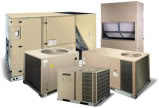HVAC Essentials

HVAC is an acronym for Heating, Ventilation and Air Conditioning, and it refers to the systems that work together to heat and cool your home. These systems include air conditioners, furnaces, thermostats, filters, ductwork and other ventilation systems. There are many different systems that are included in HVAC, from boilers and radiators to central a/c systems, programmable thermostats, forced-air heating systems and more.
Below you will find an explanation of some of the important functions and terms associated with HVAC, which will help you get a better understanding of how your HVAC system works. Familiarity with your HVAC system will help you figure out ways to make your system more energy-efficient and make it easier to diagnose any problems as they arise. If a problem with your HVAC system arises that you can't fix on your own, make sure you find a reliable and professional HVAC contractor to help you.
Essential HVAC Terms
Annualized Fuel Utilization Efficiency (AFUE):
AFUE is a measure of heating efficiency. More efficient furnaces have a higher AFUE. A good-quality furnace will have a rating of at least 80%. A furnace with a very high energy-efficiency rating will be rated at 90%. An energy-efficient furnace will not only help the environment, but it will also save you a great deal of money. So make sure you consider purchasing an energy-efficient furnace with a high AFUE percentage. In fact, if you have a 95% AFUE furnace, then for every $100 in heating costs, you can save about $23. Add that up for the entire winter and you can save a lot of money!
British Thermal Unit (BTU):
The size of a heating unit is expressed in BTUs per hour. Common sizes are 40,000, 60,000, 80,000, 100,000, and 120,000 btu/hr. If you have a large home, you will need a furnace with a high BTU/hr.
Central Air Conditioning:
Central air conditioning means that cool air is distributed throughout your home from a central location.
Compressor:
This device is located on your outdoor air-conditioning unit. Its function is to compress and pump cooling refrigerant. Compressors need to be maintained by being cleaned a few times a year, and in some circumstances, they should be covered during snowy months.
Ductwork:
Air is distributed from the furnace or blower coil via ductwork (a system of pipes and vents) throughout your home. Annual ductwork cleaning is beneficial to those who suffer from allergies. All homes should have their ductwork cleaned out every few years.
Energy Star:
Energy Star is a regulated standard for energy-efficient consumer products. It was first created as a United States government program in 1992. HVAC products, such as filters and furnaces, carrying the Energy Star logo save 20%-30%, on average. Learn more at Energystar.gov.
Furnace Filters:
Filters are important to your health, as the right filter directly affects your health. Filters work to reduce your exposure to unhealthy air particles that are present in your home. There are many different kinds of filters for your HVAC system, including electrostatic filters, pleated filters and more.
Geothermal Heating:
Geothermal heating is the direct use of geothermal power for heating applications in your home. Geothermal heating uses heat pumps to actively pump heat from shallow ground. It uses the earth as a source of heat in the winter, and as a coolant in the summer.
Heat Exchanger:
It transfers heat to air that is distributed throughout the home.
Humidifier:
This device sends moisture into heated air as it leaves the furnace. Every HVAC system needs to have a humidifier, as it works to keep you healthy by keeping the air quality in your home at a healthy level. Health problems can occur when the humidity level in your home is too low or too high, so it is really important to make sure your HVAC unit has a good humidifier. A good humidifier will also help you conserve energy.
MERV Rating:
A rating for air filters. MERV stands for Minimum Efficiency Reporting Value. Filters with smaller holes have higher MERV values and better efficiency.
Programmable Thermostats:
Programmable thermostats offer you features by which you can set the heat or air to go on and off at different times of the day or night. This can yield tremendous energy savings for homeowners.
Looking for a Pro? Call us (866) 441-6648

Heating & cooling Average Costs
HVAC Contractors Experiences

Urgent Air Conditioner Repair At Pizzeria Caught In A Heatwave

Baseboard Heater Inspection And Repair By A Determined Contractor



